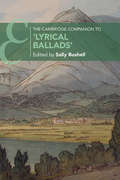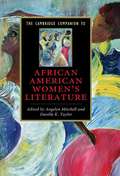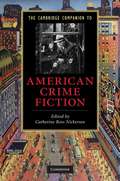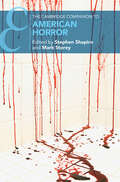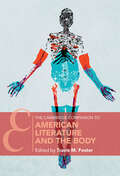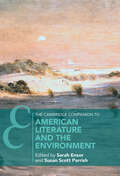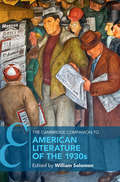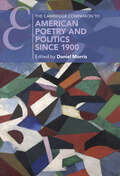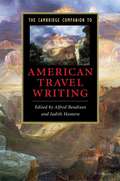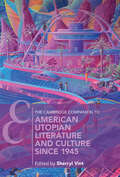- Table View
- List View
The Cambridge Companion To Ezra Pound
by Ira B. NadelThis Companion contains fifteen chapters by leading international scholars, who together reflect diverse but complementary approaches to the study of Ezra Pound's poetry and prose. They consider the poetics, foreign influences, economics, politics and publication history of Pound's entire corpus, and reveal his importance in developing some of the key movements in twentieth-century poetry. The book also situates Pound's work in the context of Modernism, illustrating his influence on contemporaries like T. S. Eliot and James Joyce. Taken together, the chapters offer a sustained examination of one of the most versatile, influential and certainly controversial poets of the modern period.
The Cambridge Companion To Mario Vargas Llosa
by John King Efraín KristalOne of the major novelists in world literature over the last five decades, Mario Vargas Llosa (b. 1936) is also one of Latin America's most engaging public intellectuals, a critic of art and culture, and a playwright of distinction. This Companion's chapters chart the development of Vargas Llosa's writings from his rise to prominence in the early 1960s to the award of the Nobel Prize for Literature in 2010. The volume traces the development of his literary trajectory and the ways in which he has re-invented himself as a writer. His vast output of narrative fiction is the main focus, but the connections between his concerns as a creative writer and his rich career as a cultural and political figure are also teased out in this engaging, informative book.
The Cambridge Companion To The French Novel
by Timothy UnwinThis volume offers a unique and valuable insight into the novel in French over the past two centuries. In a series of essays, acknowledged experts discuss a variety of topics including nineteenth-century realism, women and fiction, popular fiction, experiment and innovation, war and the Holocaust, the Francophone novel, and postmodern fiction. They offer a challenging reassessment of major figures, while deliberately reading traditional views of literary history against the grain. Theoretical discussion is combined with close reading of texts and exploration of context, comparison with other genres and other literatures, and reference to novels from earlier periods. This companionable introduction includes a chronology and guide to further reading. From it emerges a strong sense of the vitality and energy of the modern French novel, and of the debates surrounding it.
The Cambridge Companion To Virginia Woolf
by Susan SellersVirginia Woolf is now hailed as one of the greatest, most innovative writers of our age. This landmark collection of essays by leading scholars in the field addresses the full range of her intellectual perspectives - literary, artistic, philosophical and political. The Cambridge Companion to Virginia Woolf provides original, new readings of all nine novels and fresh insight into Woolf's letters, diaries and essays allowing easy reference to individual themes and texts. The progress of Woolf's thinking is revealed from Bloomsbury aestheticism through her hatred of censorship, corruption and hierarchy to her concern with all aspects of modernism. The volume reflects the changing face of Woolf scholarship especially in the light of new feminist approaches, and explores the immense range of social and political issues behind her ongoing search for new narrative forms.
The Cambridge Companion To Wittgenstein
by Hans Sluga David G. SternLudwig Wittgenstein (1889â "1951) is one of the most important, influential, and often-cited philosophers of the twentieth century, yet he remains one of its most elusive and least accessible. The essays in this volume address central themes in Wittgenstein's writings on the philosophy of mind, language, logic, and mathematics. They chart the development of his work and clarify the connections between its different stages. The contributors illuminate the character of the whole body of work by keeping a tight focus on some key topics: the style of the philosophy, the conception of grammar contained in it, rule-following, convention, logical necessity, the self, and what Wittgenstein called, in a famous phrase, â forms of life'.
The Cambridge Companion to
by Allison PeaseTo The Lighthouse is one of the most important of Virginia Woolf's modernist achievements. Written by leading international scholars of Woolf and modernism, this Companion to To The Lighthouse will be of interest to students and scholars alike. Individual chapters explore the biographical and textual genesis of the novel; its narrative perspectives and use of form; its thematic and formal attention to time and space; and its representations of feminism and gender as well as generational change, race, and class. Complete with a chapter on the novel's critical history, a chronology, and a guide to further reading, this volume synthesizes To The Lighthouse's major ideas and formal innovations while also summarizing and advancing critical debate.
The Cambridge Companion to 'Lyrical Ballads' (Cambridge Companions to Literature)
by Sally BushellLyrical Ballads (1798) is a work of huge cultural and literary significance. The volume of poetry, in which Coleridge's Rime of the Ancyent Marinere and Wordsworth's Lines written above Tintern Abbey were first published, lies at the heart of British Romanticism, establishing a poetics of powerful feeling, that is, nonetheless, expressed in direct, conversational language and exploring the everyday realities of common life. This engaging, accessible collection provides a comprehensive overview of current approaches to Lyrical Ballads, enabling readers to find fresh ways of understanding and responding to the volume. Sally Bushell's introduction explores how the Preface to the second edition (1800) became a potent manifesto for the Romantic movement. Broad in scope, the Companion includes accessible essays on Wordsworth's experiments with language and metre, ecocritical approaches, the reception of the volume in America and more; furnishing students and scholars with a range of entry points to this seminal text.
The Cambridge Companion to African American Theatre
by Harvey YoungThis Companion provides a comprehensive overview of African American theatre, from the early nineteenth century to the present day. Along the way, it chronicles the evolution of African American theatre and its engagement with the wider community, including discussions of slave rebellions on the national stage, African Americans on Broadway, the Harlem Renaissance, African American women dramatists, and the 'New Negro' and 'Black Arts' movements. Leading scholars spotlight the producers, directors, playwrights and actors whose efforts helped to fashion a more accurate appearance of black life on stage, and reveal the impact of African American theatre both within the United States and further afield. Chapters also address recent theatre productions in the context of political and cultural change and ask where African American theatre is heading in the twenty-first century.
The Cambridge Companion to African American Women's Literature
by Angelyn Mitchell Danille K. TaylorThe Cambridge Companion to African American Women's Literature covers a period dating back to the eighteenth century. These specially commissioned essays highlight the artistry, complexity and diversity of a literary tradition that ranges from Lucy Terry to Toni Morrison. A wide range of topics are addressed, from the Harlem Renaissance to the Black Arts Movement, and from the performing arts to popular fiction. Together, the essays provide an invaluable guide to a rich, complex tradition of women writers in conversation with each other as they critique American society and influence American letters. Accessible and vibrant, with the needs of undergraduate students in mind, this Companion will be of great interest to anybody who wishes to gain a deeper understanding of this important and vital area of American literature.
The Cambridge Companion to Alexander Pope
by Pat RogersAlexander Pope was the greatest poet of his age and the dominant influence on eighteenth-century British poetry. His large oeuvre, written over a thirty-year period, encompasses satires, odes and political verse and reflects the sexual, moral and cultural issues of the world around him, often in brilliant lines and phrases which have become part of our language today. This is the first overview to analyse the full range of Pope's work and to set it in its historical and cultural context. Specially commissioned essays by leading scholars explore all of Pope's major works, including the sexual politics of The Rape of the Lock, the philosophical enquiries of An Essay on Man and the Moral Essays, and the mock-heroic of The Dunciad in its various forms. This volume will be indispensable not only for students and scholars of Pope's work, but also for all those interested in the Augustan age.
The Cambridge Companion to Alice Munro
by David StainesThis Companion is a thorough introduction to the writings of the Nobel Prize winner Alice Munro. Uniting the talents of distinguished creative writers and noted academics, David Staines has put together a comprehensive, exploratory account of Munro's biography, her position as a feminist, her evocation of life in small-town Ontario, her non-fictional writings as well as her short stories, and her artistic achievement. Considering a wide range of topics – including Munro's style, life writing, her personal development, and her use of Greek myths, Celtic ballads, Norse sagas, and popular songs – this volume will appeal to keen readers of Munro's fiction as well as students and scholars of literature and Canadian and gender studies.
The Cambridge Companion to American Crime Fiction
by Catherine Ross Nickerson"From the execution sermons of the Colonial era to television programs like The Wire and The Sopranos, crime writing has played an important role in American culture. Its ability to register fear, desire and anxiety has made it a popular genre with a wide audience. These new essays, written for students as well as readers of crime fiction, demonstrate the very best in contemporary scholarship and challenge long-established notions of the development of the detective novel. Each chapter covers a sub-genre, from 'true crime' to hard-boiled novels, illustrating the ways in which 'popular' and 'high' literary genres influence and shape each other. With a chronology and guide to further reading, the Companion is a helpful guide for students of American literature and readers of crime fiction"--Provided by publisher. "The Satisfactions of Murder Catherine Ross Nickerson When coroners and medical examiners decide that the corpse before them is the victim of homicide, they announce their findings with a ringing locution: "by a person or persons unknown. " And while the identity of the killer may truly be a cipher in the real world, within the confines of a detective novel, the perpetrator is known to us. He or she is hiding in plain sight among the array of characters in the book"--Provided by publisher.
The Cambridge Companion to American Fiction after 1945
by John N. DuvallEach generation revises literary history and this is nowhere more evident than in the post-Second World War period. This 2011 Companion offers a comprehensive, authoritative and accessible overview of the diversity of American fiction since the Second World War. Essays by nineteen distinguished scholars provide critical insights into the significant genres, historical contexts, cultural diversity and major authors during a period of enormous American global political and cultural power. This power is overshadowed, nevertheless, by national anxieties growing out of events ranging from the Civil Rights Movement to the rise of feminism; from the Cold War and its fear of Communism and nuclear warfare to the Age of Terror and its different yet related fears of the 'Other'. American fiction since 1945 has faithfully chronicled these anxieties. An essential reference guide, this Companion provides a chronology of the period, as well as guides to further reading.
The Cambridge Companion to American Horror (Cambridge Companions to Literature)
by Stephen Shapiro Mark StoreyOpening up the warm body of American Horror – through literature, film, TV, music, video games, and a host of other mediums – this book gathers the leading scholars in the field to dissect the gruesome histories and shocking forms of American life. Through a series of accessible and informed essays, moving from the seventeenth century to the present day, The Cambridge Companion to American Horror explores one of the liveliest and most progressive areas of contemporary culture. From slavery to censorship, from occult forces to monstrous beings, this book is essential reading for anyone interested in America's most terrifying cultural expressions.
The Cambridge Companion to American Literature and the Body (Cambridge Companions to Literature)
by Travis M. FosterThe human body has been depicted in a variety of ways across a range of cultural and historical locations. It has been described, variously, as a biological entity, clothing for the soul, a site of cultural production, a psychosexual construct, and a material encumbrance. Each of these different approaches brings with it a range of anthropological, political, theological, and psychological discourses that explore and construct identities and subject positions. This Companion examines connections between American literature and bodies from the eighteenth century through the present. It reveals the singular way that literature can help us understand the body's entanglement within social and biological influences, and it traces the body's existence within histories of race, gender, and ability. This volume details the genres, critical fields, and interpretive practices that best facilitate the analysis of bodies in the full span of American literary imaginings.
The Cambridge Companion to American Literature and the Environment (Cambridge Companions to Literature)
by Susan Scott Parrish Sarah EnsorThis Companion offers a capacious overview of American environmental literature and criticism. Tracing environmental literatures from the gates of the Manzanar War Relocation Camp in California to the island of St. Croix, from the notebooks of eighteenth-century naturalists to the practices of contemporary activists, this book offers readers a broad, multimedia definition of 'literature', a transnational, settler colonial comprehension of America, and a more-than-green definition of 'environment'. Demonstrating links between ecocriticism and such fields as Black feminism, food studies, decolonial activism, Latinx studies, Indigenous studies, queer theory, and carceral studies, the volume reveals the persistent relevance of literary methods within the increasingly interdisciplinary field of Environmental Humanities, while also modeling practices of literary reading shaped by this interdisciplinary turn. The result is a volume that will prove indispensable both to students seeking an overview of American environmental literature/criticism and to established scholars seeking new approaches to the field.
The Cambridge Companion to American Literature of the 1930s (Cambridge Companions to Literature)
by William SolomonThis Companion offers a compelling survey of American literature in the 1930s. These thirteen new essays by accomplished scholars in the field provide re-examinations of crucial trends in the decade: the rise of the proletarian novel; the intersection of radical politics and experimental aesthetics; the documentary turn; the rise of left-wing theatres; popular fictional genres; the impact of Marxist thought on African-American historical writing; the relation of modernist prose to mass entertainment. Placing such issues in their political and economic contexts, this Companion constitutes an excellent introduction to a vital area of critical and scholarly inquiry. This collection also functions as a valuable reference guide to Depression-era cultural practice, furnishing readers with a chronology of important historical events in the decade and crucial publication dates, as well as a wide-ranging bibliography for those interested in reading further into the field.
The Cambridge Companion to American Modernism
by Walter KalaidjianThe Cambridge Companion to American Modernism provides a comprehensive and authoritative overview of American literary modernism from 1890 to 1939. These original essays by twelve distinguished scholars of international reputation offer critical overviews of the major genres, literary culture, and social contexts that define the current state of Modern American literature and cultural studies. Among the diverse topics covered are nationalism, race, gender and the impact of music and visual arts on literary modernism, as well as overviews of the achievements of American modernism in fiction, poetry and drama. The book concludes with a chapter on modern American criticism. An essential reference guide to the field, the Companion offers readers a chronology of key events and publication dates covering the first half of the twentieth century in the United States, and an up-to-date bibliography of further reading organized by chapter topics.
The Cambridge Companion to American Novelists
by Timothy ParrishThis Companion examines the full range and vigor of the American novel. From the American exceptionalism of James Fenimore Cooper to the apocalyptic post-Americanism of Cormac McCarthy, these newly commissioned essays from leading scholars and critics chronicle the major aesthetic innovations that have shaped the American novel over the past two centuries. The essays evaluate the work, life, and legacy of influential American novelists including Melville, Twain, James, Wharton, Cather, Faulkner, Ellison, Pynchon, and Morrison, while situating them within the context of their literary predecessors and successors. The volume also highlights less familiar, though equally significant writers such as Theodore Dreiser and Djuna Barnes, providing a balanced and wide-ranging survey of use to students, teachers, and general readers of American literature.
The Cambridge Companion to American Poetry and Politics since 1900 (Cambridge Companions to Literature)
by Daniel MorrisThe Cambridge Companion to Twentieth Century American Poetry and Politics shows how American poets have addressed political phenomena since 1900. This book helps students, teachers, and general readers make sense of the scope and complexity of the relationships between poetry and politics. Offering detailed case studies, this book discusses the relationships between poetry and social views found in work by well-established authors such as Wallace Stevens, Langston Hughes, and Gwendolyn Brooks, as well as lesser known, but influential figures such as Muriel Rukeyser. This book also emphasizes the crucial role contemporary African-American poets such as Claudia Rankine and leading spoken word poets play in documenting political themes in our current moment. Individual chapters focus on specific political issues - race, institutions, propaganda, incarceration, immigration, environment, war, public monuments, history, technology - in a memorable and teachable way for poetry students and teachers.
The Cambridge Companion to American Poetry since 1945
by Jennifer AshtonThe extent to which American poetry reinvented itself after World War II is a testament to the changing social, political, and economic landscape of twentieth-century American life. Registering an important shift in the way scholars contextualize modern and contemporary American literature, this Companion explores how American poetry has documented and, at times, helped propel the literary and cultural revolutions of the past sixty-five years. Offering authoritative and accessible essays from fourteen distinguished scholars, the Companion sheds new light on the Beat, Black Arts, and other movements while examining institutions that govern poetic practice in the United States today. The text also introduces seminal figures like Sylvia Plath, John Ashbery, and Gwendolyn Brooks while situating them alongside phenomena such as the "academic poet" and popular forms such as spoken word and rap, revealing the breadth of their shared history. Students, scholars, and readers will find this Companion an indispensable guide to post-war and late twentieth-century American poetry.
The Cambridge Companion to American Poets: The Cambridge Companion to American Poets
by Mark RichardsonThe Cambridge Companion to American Poets brings together thirty-one essays on some fifty-four American poets, spanning nearly 400 years, from Anne Bradstreet to contemporary performance poetry. This book also examines such movements in American poetry as modernism, the Harlem (or New Negro) Renaissance, 'confessional' poetry, the Black Mountain School, the New York School, the Beats, and L=A=N=G=U=A=G=E poetry. Its reputable host of contributors approach American poetry from perspectives as diverse as the poetry itself. The result is a Companion concise enough to be read with pleasure yet expansive enough to do justice to the many traditions American poets have modified, inaugurated, and made their own.
The Cambridge Companion to American Science Fiction
by Gerry Canavan Eric Carl LinkThe Cambridge Companion to American Science Fiction explores the relationship between the ideas and themes of American science fiction and their roots in the American cultural experience. Science fiction in America has long served to reflect the country's hopes, desires, ambitions, and fears. The ideas and conventions associated with science fiction are pervasive throughout American film and television, comics and visual arts, games and gaming, and fandom, as well as across the culture writ large. Through essays that address not only the history of science fiction in America but also the influence and significance of American science fiction throughout media and fan culture, this companion serves as a key resource for scholars, teachers, students, and fans of science fiction.
The Cambridge Companion to American Travel Writing
by Judith Hamera Alfred BendixenTravel writing has always been intimately linked with the construction of American identity. Occupying the space between fact and fiction, it exposes cultural fault lines and reveals the changing desires and anxieties of both the traveller and the reading public. These specially-commissioned essays trace the journeys taken by writers from the pre-revolutionary period right up to the present. They examine a wide range of responses to the problems posed by landscapes found both at home and abroad, from the Mississippi and the Southwest to Europe and the Holy Land. Throughout, the contributors focus on the role played by travel writing in the definition and formulation of national identity, and consider the experiences of minority writers as well as canonical authors. This Companion forms an invaluable guide for students approaching this new, important and exciting subject for the first time.
The Cambridge Companion to American Utopian Literature and Culture since 1945 (Cambridge Companions to Literature)
by Sherryl VintProviding a comprehensive overview of American thought in the period following World War II, after which the US became a global military and economic leader, this book explores the origins of American utopianism and provides a trenchant critique from the point of view of those left out of the hegemonic ideal. Centring the voices of those oppressed by or omitted from the consumerist American Dream, this book celebrates alternative ways of thinking about how to create a better world through daily practices of generosity, justice, and care. The chapters collected here emphasize utopianism as a practice of social transformation, not as a literary genre depicting a putatively perfect society, and urgently make the case for why we need utopian thought today. With chapters on climate change, economic justice, technology, and more, alongside chapters exploring utopian traditions outside Western frameworks, this book opens a new discussion in utopian thought and theory.

